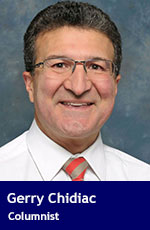 Early-20th-century electrical engineer Charles Proteus Steinmetz said, “There are no foolish questions and no man becomes a fool until he stops asking questions.”
Early-20th-century electrical engineer Charles Proteus Steinmetz said, “There are no foolish questions and no man becomes a fool until he stops asking questions.”
Steinmetz is right. Asking questions is vital in seeking truth and finding wisdom.
Many things are happening in the world where the narrative perpetrated simply doesn’t make sense.
We’re told, for example, that the Jan. 6 attack on the American Capitol and the Black Lives Matter protests were primarily about race. When I look at the people involved in both, however, I see that they have a lot in common.
Black Lives Matter protests flared up during a global pandemic when many were out of work and struggling to feed their families.
So did the attack of Jan. 6. Data from the Washington Post shows that most of those arrested come from financially disadvantaged backgrounds. One, therefore, needs to question their level of education and their training in critical thinking.
While they’re certainly responsible for their crimes, the more important question would be: Who funded the flow of information to these people that made them think that it was a good idea to attack the heart of their democracy?
Maybe we’re not dealing with a racial issue at all.
In a recent interview, Dr. William Barber of the Poor People’s Campaign spoke of an interesting encounter he had as a black man when speaking in rural Kentucky. He spoke to a white audience about both racist policies and policies that negatively impacted the poor. One member of the audience stood up and said, “We’re being played against each other!”
It seems that many groups are being played against each other.
To better understand the conflict between Israelis and Palestinians, I’ve observed numerous citizen forums. The theme is similar to that which Barber observed. Individual Palestinians and Jews realize that they’re not enemies, but there seems to be a constant voice echoing that they’re to hate each other.
Going back to the 1960s, it was once believed that Malcolm X was murdered by Muslim extremists. But new evidence is emerging to cast significant doubt on this theory.
No one seemed to mind terribly when he said, “The white man is the devil,” but Malcolm X was continually becoming more enlightened. As part of his spiritual journey, he visited Mecca. There he had a powerful experience with Muslims of all colours and came to believe that all races needed to come together. It was not long after this that he was murdered.
Martin Luther King Jr. also expanded his message of racial justice to one of economic justice. In addition, he openly opposed the war in Vietnam. He too was murdered.
Despite what many believe, race doesn’t seem to be the issue. People are people, there’s good and there’s bad in every group. There’s good and bad in every person.
Where’s this message of hate coming from? Who’s paying to have it disseminated?
As an educator, I believe that teaching critical thinking skills is vital in promoting honest and respectful dialogue. Yet schools in many regions are underfunded, resulting in populations that are very susceptible to extremism.
We’re responding the wrong way to extremism. We need not point the finger at one another, we need to ask: Who is telling me to hate you and how do they profit if I believe that message?
Perhaps the freedom to ask this question is our greatest form of resistance.
The answer to our problems is to promote programs that benefit all citizens, especially the most vulnerable. This applies to domestic and foreign policy.
We also need to be very suspicious of all messages of hate.
Troy Media columnist Gerry Chidiac is an award-winning high school teacher specializing in languages, genocide studies and work with at-risk students.
For interview requests, click here.
The views, opinions and positions expressed by columnists and contributors are the author’s alone. They do not inherently or expressly reflect the views, opinions and/or positions of our publication.

